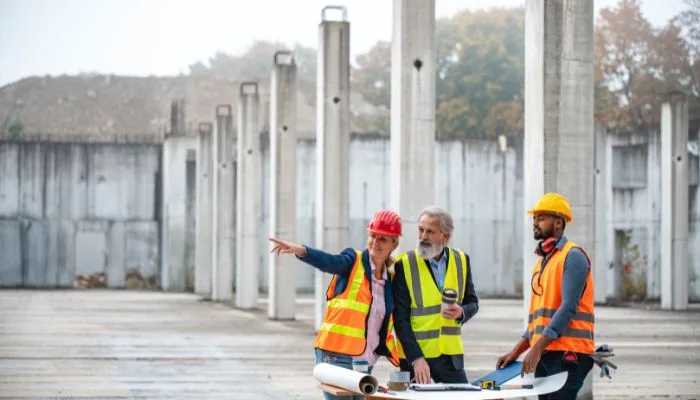The facilities engineer is typically responsible for both the day-to-day maintenance and long-term planning of all plant systems. The engineer usually outlines a preventative maintenance plan for each system in the building, detailing when to replace parts and conduct efficiency tests. There may be a need for more than one facility engineer in a facility, depending on its size and complexity. As a result, each engineer may concentrate on a facet of the business while still ensuring that everything is running smoothly and effectively.
The mechanisms that power a factory are the brainchild of facilities engineers. This person will not only be responsible for creating the architecture of the production process, but also for the design of the utility systems within the area, such as the provision of energy, climate control, water, and lighting. He or she may also be responsible for the design and upkeep of more specialized systems, including those used in chemical processing or environmental controls.
Table of Contents
What Is a Facilities Engineer?
Buildings and their associated systems are under the watchful eye of a facilities engineer. Facilities engineers typically work on the layout of factories and other production facilities. The primary focus of a facilities engineer’s work is the creation of blueprints and models through the use of a drawing program. While you’re usually tasked with constructing brand-new buildings, you can also get hired to fix up older structures or upgrade outdated internal infrastructure.
A bachelor’s degree in engineering is required for a career as a facilities engineer. You’ll also need to pass the NCEES’s professional engineering exam to become a licensed engineer. The test is broken up into two parts: the first is taken just after graduation, and the second is taken after four years of experience.
Career Path for Facilities Engineers
1. Obtain a bachelor’s degree
To embark on a career as a facilities engineer, the first step is to earn a bachelor’s degree. This is the minimum educational requirement for this profession. Bachelor’s degree programs typically last around four years and encompass various subjects, including civil, mechanical, and structural engineering. The curriculum covers a wide range of topics such as mechatronics, thermodynamics, automatic control mechanisms, and computer-aided design (CAD).
Students may also have the opportunity to gain practical experience by participating in laboratory classes where they can engage in the fabrication, construction, and disassembly of machinery. Additionally, some programs may include project management components that involve estimating costs, project timelines, and financial benefits.
2. Seek Entry-Level Employment
After completing a bachelor’s degree, aspiring facilities engineers can pursue entry-level positions. In these roles, they are responsible for assessing machine performance, identifying areas of inefficiency, and proposing improvements.
Engineers often analyze machine designs, utilize CAD software and mathematical modeling to make modifications, and conduct performance tests. Once an optimal prototype or model is developed, engineers collaborate with technicians to coordinate the implementation of changes.
3. Obtain an Engineering License
Obtaining a professional engineering license is necessary for facilities engineers who offer their services to the public. The licensing requirements may vary by state but typically involve completing an accredited engineering program, documenting relevant work experience, and passing a state examination.
Many graduates choose to take the Fundamentals of Engineering (FE) exam as the initial step toward licensure. Successful completion of this exam grants the title of engineer-in-training (EIT). After accumulating four years of documented work experience, EITs become eligible to take the Principles and Practice of Engineering (PE) exam, leading to the professional engineer (PE) designation.
Some states may have additional requirements for PEs, such as mandatory continuing education that may involve taking college-level courses, attending seminars, or publishing research papers.
4. Consider Voluntary Certification
While not mandatory, voluntary certifications can enhance career prospects for facilities engineers. The Association for Facilities Engineering offers the Certified Plant Engineer (CPE) certification to qualified individuals. Eligibility typically requires an engineering degree and either four years of facility management experience or six years of industry experience.
The certification is valid for three years, and candidates can renew it by demonstrating continuous employment and participating in approved seminars and workshops.
to pursue a career as a facilities engineer, individuals should follow the career path of earning a bachelor’s degree, gaining entry-level work experience, obtaining an engineering license, and considering voluntary certification from organizations like the Association for Facilities Engineering.
Facilities Engineer Responsibilities
- Specifying requirements for infrastructure and resources.
- Budgeting and conducting cost analysis for projects.
- Planning and supervising the construction of extensions, new layouts, new systems, and improved quality assurance measures.
- Assessing the systems and infrastructure of the facility to determine and enhance operational efficiencies.
- Utilizing optimal resource allocation and developing processing plans.
- Carefully planning and coordinating the maintenance of facilities and machinery.
- Coordinating and managing contractors for maintenance activities.
- Ensuring compliance with rules and regulations, particularly those related to health and safety in the workplace.
- Reporting and record-keeping for regulatory purposes.
Facilities Engineer skills
To excel as a facilities engineer, both technical knowledge and soft skills are necessary. These skills contribute to the successful completion of projects involving the planning, analysis, and construction of diverse facilities. Here are the key abilities that can help you succeed in the role of a facilities engineer:
- Thorough cost analysis: Before overseeing project finances, facilities engineers must conduct a comprehensive cost analysis. Strong expense analysis and management skills enable economic planning and execution of building projects.
- Collaboration: As a facilities engineer, close collaboration with expert teams and regular interaction with clients and other departments is crucial. Excellent teamwork and coordination skills are essential in the field of engineering.
- Understanding and adherence to building regulations: Compliance with local building rules and regulations is vital to ensure efficient design and save time and money.
- Technical acuity: Proficiency in using engineering software and computer systems to analyze data, design plans, and manage project-related information.
- Blueprint reading and preparation: The ability to accurately read and create blueprints is essential for conveying design specifications to construction teams and making improvements to existing structures.
- Knowledge of engineering principles: Familiarity with mechanical, electrical, and chemical engineering principles is necessary for designing complex systems and functional equipment.
- Project management: Facilities engineers oversee construction projects, ensuring timely and budget-compliant completion. Effective project management skills facilitate smooth collaboration and successful outcomes.
- Safety awareness: Recognizing the importance of safety when dealing with potentially hazardous situations or materials. Prioritizing safety ensures secure constructions and reduces the likelihood of accidents.
By honing these abilities, facilities engineers can enhance their efficiency and effectiveness in their role of building and maintaining facilities.
Facility Engineer pros and cons
Pros:
- Extensive possibilities for professional growth and advancement
- Competitive compensation and a comprehensive benefits package
- Potential for long-term job security and travel opportunities • Collaborative and team-oriented work environment
Cons:
- Physical demands of walking, standing, and lifting heavy objects
- Exposure to hazardous materials and potentially risky situations
- Work in adverse weather conditions or uncomfortable environments
- Dealing with potential conflicts with other facility departments or stakeholders
How much does a Facilities Engineer make?
In the United States, a Facilities Engineer can expect to earn a median annual income of $105,547. Facilities Engineers receive an average bonus of $15,500 per year, or about 15% of their total remuneration, in addition to their basic salary. It’s interesting to note that each year, every single Facilities Engineer receives a bonus. The average compensation for a Facilities Engineer is $134,961 per year, and it’s highest in San Francisco. This overall pay is 28% higher than the median wage in the United States.
Frequently Asked Questions (FAQ)
Some of the crucial abilities of a Facilities Engineer include compliance, electricity, compression, troubleshooting, customer service, HVAC, and project management.
The job description of a Facilities Engineer encompasses architecture, engineering, and construction services. It includes support for operations and maintenance, energy engineering, the study of building codes, project scheduling, estimating, management, and more.
Important skills for a Facilities Engineer include collaboration, technical expertise, blueprint reading and creation, knowledge of engineering principles, and relevant certifications.
Facilities engineers specialize in military installations, facilities, civil works projects, airfields, highways, and ocean facilities, collectively known as “Facilities Engineering.”
Facility Engineering Maintenance Services (FEMS) encompass the maintenance of facilities and systems. Skilled engineers, technicians, and charge men handle electrical, mechanical, civil, and structural management, including the operation of high-voltage equipment.
In the oil and gas industry, a Facilities Engineer oversees the timely construction of surface production facilities in collaboration with drilling, completion, and production engineers. These facilities are crucial for the production, transportation, and sale of oil and gas.
Facilities Engineers ensure the smooth operation of utilities and machinery within a plant, while Lead Utilities Engineers manage construction projects from start to finish, ensuring optimal plant availability.
Industrial engineers focus on maximizing the efficiency of production facilities to manufacture goods and deliver services effectively. Constant infrastructure upgrades are made to enhance output quality.
Effective Facility Managers possess the ability to understand how physical space impacts the overall company. They continuously seek opportunities for improvement, making a noticeable impact on the company’s performance.
The strategic facility planning process involves four stages: space plan and scenario evaluation, forecasting, planning environment setup, and application and monitoring.
Facility management encompasses various aspects, including maintenance, personnel management, security, and system and process optimization. All these factors contribute to the smooth operation of the facility.
Facilities management aims to ensure the efficient operation of a building throughout its lifespan. Maintenance, on the other hand, focuses on the workers responsible for the upkeep, operation, and efficiency optimization of the facilities.
Employers often require a bachelor’s degree in civil, mechanical, or electrical engineering for positions as Facilities Engineers.
Facilities Engineers are responsible for designing, planning, and supervising the construction and maintenance of facilities. They also manage budgets and resources, ensure compliance with building rules and laws, and coordinate with various stakeholders.
Common software tools utilized by Facilities Engineers include computer-aided design (CAD) software, project management software, energy modeling software, and facilities management systems.
Project management is crucial for Facilities Engineers as they oversee and direct construction projects from start to finish, ensuring successful outcomes.
Facilities Engineers are responsible for implementing safety measures such as fire safety design, emergency evacuation plans, compliance with occupational health and safety regulations, and conducting risk assessments.
Environmental responsibility is increasingly important in Facilities Engineering. Facilities Engineers aim to incorporate energy efficiency, renewable energy systems, sustainable materials, and practices, and minimize environmental impact.
Effective verbal and written communication skills are essential for Facilities Engineers to convey project requirements, provide updates, and address issues or concerns with team members, stakeholders, contractors, and clients.
Facilities Engineers work closely with architects, contractors, electricians, plumbers, HVAC technicians, and other specialists to ensure smooth coordination and timely completion of construction projects.
Facilities Engineers can participate in professional development programs, attend industry conferences and seminars, pursue certifications, and stay updated with the latest advancements in facilities engineering to enhance their skills and knowledge.
Building code compliance is a top priority for Facilities Engineers. They conduct in-depth analyses and stay up to date with building codes, safety standards, and local regulations to ensure compliance in their projects.
Facilities Engineers implement sustainable design principles, energy-efficient systems, and renewable energy technologies to promote environmental friendliness and long-lasting outcomes in their projects.
Facilities Engineers are responsible for planning and supervising routine maintenance, monitoring repair, and replacement projects, communicating with maintenance teams, and ensuring the effective operation of facilities and equipment.
Technology plays a major role in Facilities Engineering, including the integration of smart building systems and Internet of Things (IoT) technologies for effective facility management.
Emerging trends in Facilities Engineering include the use of data analytics for predictive maintenance, the introduction of smart and connected buildings, and the adoption of sustainable and green technologies.



